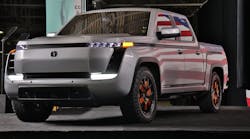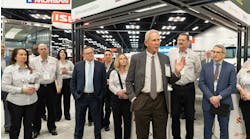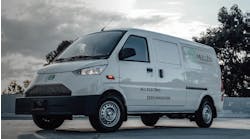Lordstown CEO, CFO resign after investigation into shortseller claims
After a rough start to 2021, and with the company unsure it has the capabilities and capital to start commercial production on the Lordstown Endurance battery-electric full-size pickup truck, Steve Burns, the founder and CEO of Lordstown Motors Corp., has resigned. Chief Financial Officer Julio Rodriguez has also departed.
Angela Strand, co-founder of electric van startup Chanje, has been promoted to LMC executive chairwoman to find a replacement for Burns; she was previously the company’s lead independent director. Veteran financial executive Becky Roof assumed the role of interim CFO.
The leadership transition was announced concurrently with the findings from an investigation into claims made by “activist” short seller Hindenburg Research that raised doubts about LMC’s ability to start production in September, the durability of the in-hub motors, and the legitimacy of Endurance pre-orders. The timing of the announcements suggest the investigation and resignations are in some way related, though LMC did not outright say the leadership changes were influenced by the board's special committee findings.
David Hamamoto, LMC board member and former chairman of DiamondPeak Holdings Corp., which combined with LMC to create the publicly traded entity (Nasdaq: RIDE), stated: “Lordstown Motors has achieved significant milestones on the path to developing the first and best full-size all-electric pickup truck, the Lordstown Endurance. We thank Steve Burns for his passion and commitment to the company. As we transition to the commercial stage of our business—with planned commencement of limited production in late-September—we have to put in place a seasoned management team with deep experience leading and operating publicly-listed OEM companies. We have complete confidence in Angela and Becky, and our expanded leadership team, to effectively guide the company during this interim period.”
Shares of RIDE, which crested $15 on June 8, plunged to around $9 as of 10:30 a.m. ET on June 14.
LMC maintains that production is on track for this fall, though as revealed in a recent Q1 financial filing with the Securities and Exchange Commission, initial volume will be at most 50% of previous estimates due to cash flow issues. In the Q1 2021 Form 10-Q, which was filed late with the SEC, LMC disclosed “its current level of cash and cash equivalents are not sufficient to fund commercial scale production and the launch of sale of such vehicles.”
The board’s special committee created to investigate the March Hindenburg Report concluded that “while various factors could lead to delays in the start of production, the projected September 2021 start of production remains achievable with the expectation of delivery to customers in the first quarter of 2022.”
In a statement to FleetOwner prior to the regime change, an LMC spokesperson said: “We are debt free, have significant tangible assets and multiple viable avenues to raise capital, including asset-backed financing, equity, equity-related or debt financing, loans (including our in-process application for an ATVM loan), as well as potential strategic investments over the longer term. We are already in active conversations with multiple parties to do so.”
LMC is hosting Lordstown Week starting June 21 at its Lordstown, Ohio, plant (formerly owned by General Motors) to provide more transparency into the manufacturing process and strategy, and ideally generate more interest and investment in the company and flagship product.
As for the pre-order volume, which Hindenburg called a “mirage,” LMC noted these were always non-binding and never an accurate representation of projected sales. A LMC press release in January 2021 did celebrate the surpassing of 100,000 pre-orders, but now the company is reporting it “has obtained tens of thousands of pre-orders from fleets, fleet management companies, or other end users.”
The previous number appears not to have been properly vetted, as LMC acknowledged on June 14: “One entity that provided a large number of pre-orders does not appear to have the resources to complete large purchases of trucks. Other entities provided commitments that appear too vague or infirm to be appropriately included in the total number of pre-orders disclosed.” In this regard, it appears that Hindenburg was correct to question the authenticity of at least some of the pre-orders.
LMC also pushed back on the anonymous claims from an alleged former employee that the frame was changed from plastic to aluminum and would set production back by three to four years: “That is false. While Lordstown Motors made certain changes to the materials to be used for the doors, hoods, and fenders, there has been no change to its plan to manufacture the vehicle frame from steel.”
In the report, LMC asserted the in-hub motors, licensed from Slovenian mobility company Elaphe, are durable enough for the demands of a work truck and a viable technology, despite never having been produced at scale for a passenger vehicle. The unsprung weight issue mentioned by Hindenburg is mitigated by “tuning of the suspension, reinforcing the vehicle structure, and utilizing a heavier truck chassis.”
A beta Endurance completed a satisfactory test run in the mountainous Baja region in Mexico this spring during the SCORE San Felipe 250 motorsports race, though power was an issue on the second leg of the race.
The in-hub motors will be produced manually at the 6.2-million-sq.-ft. Lordstown plant while the automated line is installed over the summer. LMC estimated motor production will be “sufficient” through 2022.
The investigation also found a fire that broke out on an Endurance prototype in January 2021 was due to a manually reworked battery and non-conforming parts, and not a systemic component issue. The driver also accelerated faster than the test parameters allowed.




